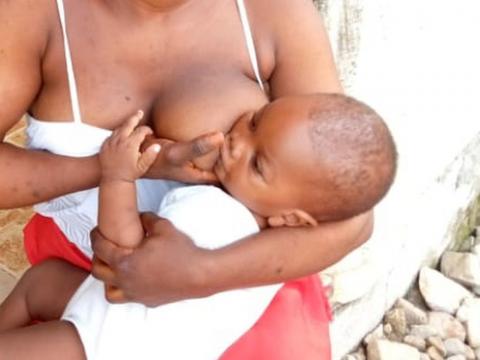By Kemo Cham
Religious leaders should use their influence and platforms to help promote the practice of breastfeeding, officials and campaigners appealed on Wednesday.
The appeal was made at a meeting organized for 30 religious leaders from the Kombra Network, mainly Imams and Pastors, as part of the commemoration of World Breastfeeding Week (WBW) 2021.
“Your voice is strong. We listen to you and take your advice through preaching. If you tell us to breastfeed our children it is likely to be adhered to. That is why we call on you,” John Tamba Allieu, Public Relations Officer of the Ministry of Health and Sanitation (MoHS), who chaired the meeting, said at the opening session.
The nearly four-hour long event held in the conference hall of the Council of Churches Sierra Leone was designed to educate the participants about the state of breastfeeding in Sierra Leone and to equipping them with information to help in the campaign to bridge the gap in breastfeeding rates in the country.
The World Health Organization (WHO) and other health authorities consider breastmilk as the best source of nutrients for babies and infants at least up to the age of two years. The emphasis is particularly on exclusive breastfeeding, which means that children should be given breastmilk exclusively from birth up to six months.
Sierra Leone has made tremendous progress in breastfeeding in the last decade, although health authorities and campaigners say there is more room for improvement. Data from the Sierra Leone Demographic Health Survey (DHS) 2013 showed that only 32 percent of babies were exclusively breastfed. The latest DHS data of 2019 indicate that 54 percent are now exclusively breastfed.
Solade Pyne-Bailey, Principal Nutritionist of the Directorate of Food and Nutrition (DFN) in the MoHS, said these gains were due to intense campaign that entailed mobilization of hospital authorities and nurses in the promotion of breastfeeding. But Ms Pyne-Bailey acknowledged that a major objective is not just to attain the target of 80 percent by 2030, but also to cut down the number of babies who are given water and other food substances in addition to breastmilk within their first six months of life.
Due to a persistent cultural practice, many women give their newborn babies water, which studies have attributed to illnesses and fatalities among children. The 2019 DHS data shows that 19 percent of babies are given water alongside breastmilk within this period.
For Sierra Leone, promotion of nutrition in general and exclusive breastfeeding in particular is part of the larger campaign of reducing maternal and infant mortality in the country, which has some of the highest death rates among these categories of children in the world.
Last month the country’s parliament passed the much-anticipated Code on breastmilk substitutes Act which, among others, is geared towards regulating the breastmilk substitutes market which campaigners say has helped in discouraging the practice of breastfeeding with a huge negative impact on the nutritional status of babies.
“Hundred percent of the food a child needs is all in the breastmilk,” said Mariama Ellie, a nutritionist at the DFN, in a presentation on the state of nutrition in the country.
The WBW is commemorated every year within the first week of August. But the whole month is also used to promote the practice. The MoHS, through the DFN, has spent the last over two weeks engaging key groups of people in society, including market women and the media on the subject.
The theme for this year’s commemoration of the WBW is: ‘Protecting breastfeeding, a shared responsibility.’
Hannah Yankson, WHO’s National Professional Officer for Nutrition and Food Safety, spoke on the myths and misconceptions that are discouraging some women from breastfeeding their babies, noting that religious leaders could make a huge difference in efforts to change this situation by joining the campaign.
“It is no longer business as usual. We need to change our strategy. We need a plan to approach it,” she told the participants who were drawn from the membership of the Kombra Network within the Western Area Rural and Urban.
Amie Lompri Kamara of the UN children’s agency, UNICEF said the role of religious leaders was important because they had influence over the largest portion of population, hence their strategic role in the crusade.
While emphasizing on the relevance of exclusive breastfeeding, Kamara noted that its benefits included enhancing the brain development and intelligence of the child, including boosting the mothers’ chance against certain diseases like cancers.
“Breastmilk is free, cost nothing and available at any time,” she stressed.
Ms Kamara also said that breastmilk had about 80 percent of water, dispelling concerns among parents who justify their decision to give their babies water with the excuse that they feel thirsty.
“We found out that water is the most common substance mothers give to their babies,” she said, referring to the 2019 DHS.
During the launch of the WBW commemoration at the beginning of the month, the MoHS also launched a campaign geared towards discouraging the practice of giving water to newborn babies up to their sixth month, dubbed the ‘Stronger with Breastmilk Only Initiative’ campaign.
Mohamed Bailor Jalloh, Chief Executive Officer of FOCUS 1000, which co-hosted Wednesday’s event and a leading campaigner for child healthcare, said the use of religious leaders in the campaign to promote breastfeeding was a strategic one given their influence in society.
“We believe that the message is important, but the messenger is equally important,” said Jalloh, adding that if an important message is given to the wrong person, it could be counterproductive. He urged the participants to ensure that they cascaded the knowledge gained to their congregants, emphasizing on the need to involve women leaders and youth groups in churches and mosques as part of the campaign.
Copyright © 2021 Politico Online (20/08/21)








